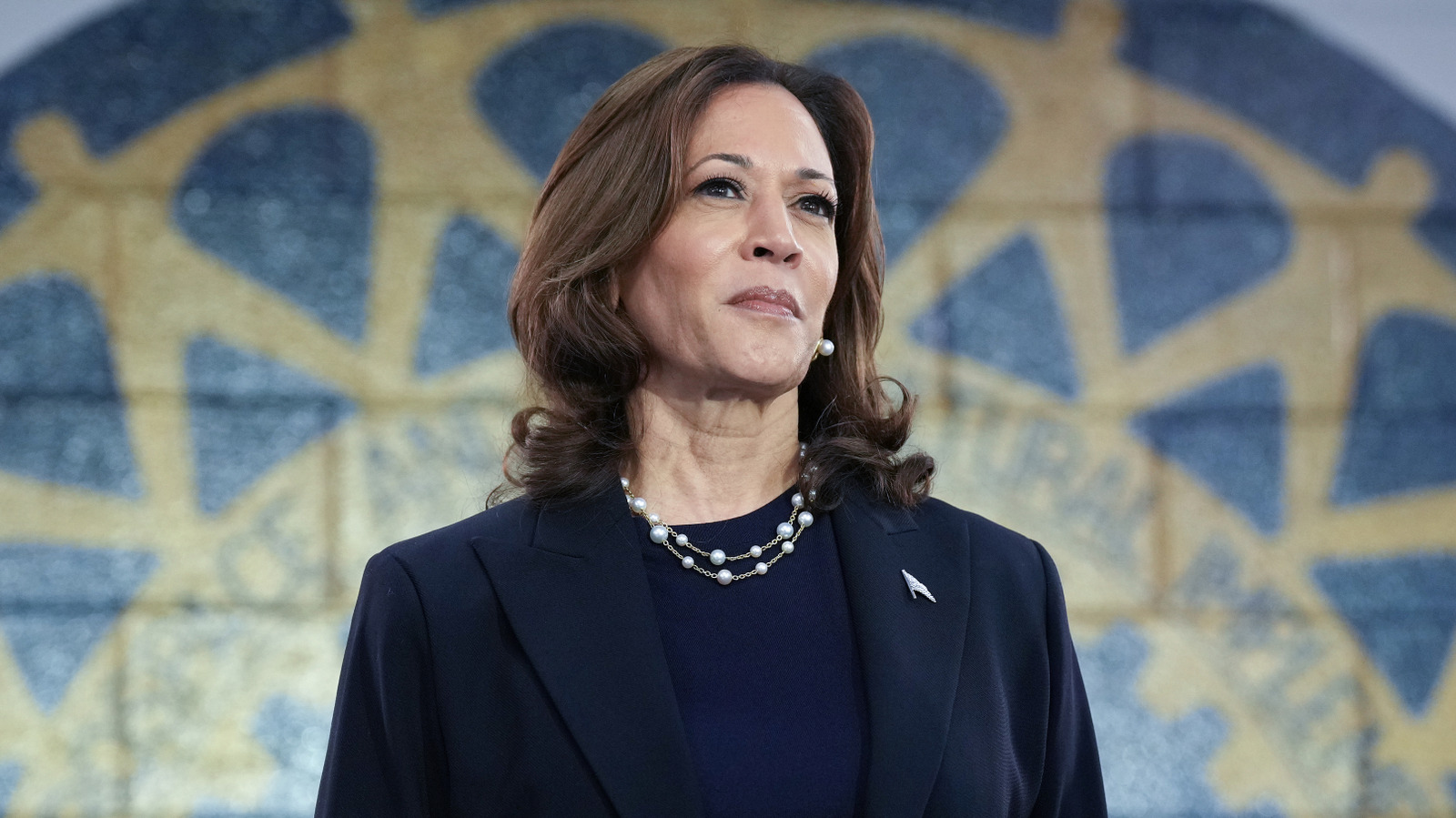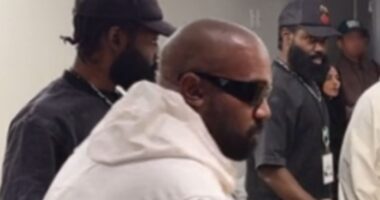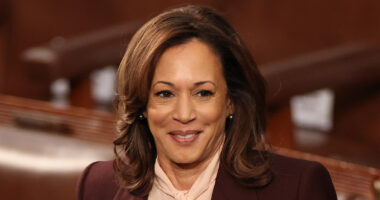We may receive a commission on purchases made from links.
There are many lesser-known facts about Kamala Harris, ranging from her almost-fanatical devotion to Chuck Taylor sneakers to her fierce devotion to Doritos, which are her snack food of choice. Yet she’s also one of the most famous people on the planet, due to her tenure as vice president of the United States and her failed presidential bid to enter the White House in 2024.
What makes her political rise all the more improbable is her origin story. As the mixed-race child of immigrants, Harris overcame modest means to become a force to be reckoned with. To do that, she’s had to break through countless glass ceilings, and has paved the way for the women who follow in her wake.
Her journey from childhood to the halls of power has been extraordinary. Even though she didn’t win the presidency she sought, her life’s story still has plenty of pages yet to be filled. To find out more, read on to experience the head-turning transformation of Kamala Harris.
She was raised by her single mother after her parents’ divorce
There are many fascinating details about Kamala Harris’ childhood. Her parents — Shyamala Gopalan, a cancer researcher who’d immigrated from India, and Donald Harris, a native of Jamaica who was studying economics — met while attending UC Berkeley in California. Kamala Harris was born in 1964, followed two-and-a-half years later by younger sister Maya. Her parents divorced when she was just 7.
Raised by her mother in Berkeley, Harris took a school bus each morning to a school in a more affluent neighborhood than the one in which she lived, due to a program intended to desegregate public schools in Berkeley. “My mother understood very well that she was raising two Black daughters,” Harris wrote in her memoir, “The Truths We Hold” (as excerpted by The Washington Post). “She knew that her adopted homeland would see Maya and me as Black girls, and she was determined to make sure we would grow into confident, proud Black women.”
Not surprisingly, Harris’ mother was a far more dominant influence during her childhood than her father. As she wrote in her autobiography (via CBS News), even though Harris’ father still played a role in his daughters’ lives, it was her mother who “was the one most responsible for shaping us into the women we would become.”
She was raised in both the Baptist and Hindu religions
Kamala Harris’ mother, Shyamala Harris, recognized that while her daughters would be perceived as Black to outsiders, it was important to educate them about the Indian half of their heritage. That included trips to India, where she met relatives and visited her grandparents. “When I was a young girl visiting my grandparents in India, I’d join my grandfather and his buddies on their morning walk along the beach as they would talk about the importance of fighting for democracy and civil rights,” she wrote in an Instagram post. “Those walks made me who I am today.”
Her mother also recognized the importance of educating her daughters about their father’s religion, in addition to her own. As a result, Harris and her sister attended Baptist church services and worshipped at a Hindu temple. Harris discussed that childhood experience in a 2017 speech she gave at an Atlanta church (as reported by the Associated Press): “we’d learn about caring for the least of these. And I sang in the choir about how faith combined with determination will always see us through difficult times.” In addition, her experience with Hinduism allowed her “to see that all faiths teach us to pursue justice.”
Prior to her 2009 death, Shyamala explained her motivation in introducing her daughters to Hinduism: “A culture that worships goddesses produces strong women,” she said.
She was a childhood activist
Social justice was front and center in Kamala Harris’ home throughout her childhood. “If you hear her talking about growing up with her parents, who were very active in the civil rights movement, it’s in her DNA. She was at marches in a stroller,” Harris’ longtime friend, Areva Martin, told The Guardian. As the Los Angeles Times recalled, during one civil rights march, the pint-sized protester’s mother asked her what she wanted: “FEE-DOM!” declared the youngster.
That ethos had certainly sunk in by the time that her mother took her girls with her when she accepted a job in Canada, teaching at Montreal’s McGill University. Harris quickly developed a reputation as an activist. When she was 13, the apartment building in which they lived enforced a policy that prohibited children from playing on the lawn. Harris and her younger sister, feeling that policy to be unfair to kids, staged a protest — which succeeded.
“She’s always been a fighter, even from those early days,” her high school classmate, Wanda Kagan, told Mercury News. “She always was sticking up for other people.”
She cut her teeth as a prosecutor in San Francisco, then became DA
After graduating from high school, Kamala Harris attended Howard University, and then got a law degree from UC Hastings College of the Law in San Francisco. Rather than take a lucrative gig with a law firm in the private sector, she instead joined the Alameda County District Attorney’s Office as a prosecutor in Oakland, California. She dove in headfirst, and the cases she faced as a young prosecutor were daunting. “It was like a potboiler of an atmosphere,” Teresa Drenick, who worked with Harris during those years, told BBC. “The amount of grief and agony you ingested every day was hard to process. For us, it was intense. The stakes being high, the crimes being so serious.”
In 2003, Harris was elected as San Francisco’s District Attorney. As DA, her intentions were clear from the first speech she gave after being elected to the office. “The greatest challenge for a district attorney, and the most serious work for us as a community, is the struggle to give meaning to justice,” she said. “Let’s put an end right here to the question of whether we’ll be tough on crime or soft on crime. Let’s be smart on crime.”
That high-profile position instantly catapulted her into the public consciousness, transforming Harris into a rising star within California’s Democratic party. It would soon be clear that DA was just one stop on a far more expansive journey.
Her relationship with legendary politician Willie Brown raised eyebrows
During her years as a prosecutor in Alameda County, Kamala Harris began dating politician Willie Brown. At the time, Brown was married (albeit separated from his estranged wife), the mayor of San Francisco, and nearly 30 years older than her. He was also one of California’s most renowned political kingmakers, a factor that did not go unnoticed when Harris began her political rise in the state. The relationship reportedly ended in 1995, after about a year.
Questions about how much influence Brown had on her skyrocketing political career resurfaced in 2019. Brown responded to rumors of political impropriety in an op-ed published in the San Francisco Chronicle. “Yes, we dated. It was more than 20 years ago,” he wrote. “Yes, I may have influenced her career by appointing her to two state commissions when I was Assembly speaker.”
However, he continued, she was just one of many who’d benefitted from his largesse, a lengthy list of California politicians ranging from Nancy Pelosi to Gavin Newsom. “The difference is that Harris is the only one who, after I helped her, sent word that I would be indicted if I ‘so much as jaywalked’; while she was DA,” he added.
Kamala Harris made history when she was elected California’s first female attorney general
The ambition that brought Kamala Harris from prosecutor to San Francisco DA bore further fruit when she ran for attorney general of California. That 2010 election placed Harris in the fight of her life, battling against Los Angeles DA Steve Cooley for the job.
On election night, with results in from 99% of the precincts, Cooley prematurely declared himself the winner — even though Harris was ahead by more than 20,000 votes. He was later forced to concede, three weeks later, when all the votes were tabulated and it was Harris who emerged victorious, garnering 74,000 more votes than her opponent (of the 9.6 million votes cast). She made history by becoming California’s first female attorney general, and the first woman of color to ever hold that role. To be fair, her victory was hardly a landslide, winning by the slimmest of margins — less than one percentage point.
“In the coming four years, and in the continuing work of the Attorney General’s office, we are going to do whatever it takes — and catch hell if necessary — in the cause of protecting and defending the lives and livelihoods of all Californians, by moving beyond the status quo,” she said in her inaugural remarks, referencing Supreme Court Chief Justice Earl, who once said, “Everything I did in my life that was worthwhile, I caught hell for.”
She married Doug Emhoff and became a ‘Mamala’
During her term as California’s attorney general, Kamala Harris met Doug Emhoff, an entertainment lawyer based in Los Angeles. After about a year of dating, Harris announced that she and the divorced father of two had gotten engaged. Speaking with SF Gate, Harris hinted that wedding bells would be ringing sooner rather than later. “I don’t believe in long engagements,” she shared.
Fittingly for a woman who’d spent her formative years in courtrooms, the two were married not in a church (nor a Hindu temple!), but in the Santa Barbara County Courthouse on August 22, 2014. Not only was Harris now a newlywed, the first-time bride also became stepmother of Emhoff’s two children from his first marriage, Cole and Ella. By all accounts, the relationship she has with her stepchildren is as solid as it gets — she reportedly set the tone in her first meeting with them, sporting a pair of her signature Chuck Taylors with cookies in hand. “I remember I saw a tweet that someone did … a photo of Kamala at the Kavanaugh hearing, and someone tweeted, like, ‘I’d hate to have to look at that face and explain why I’m late for curfew.’ And I was thinking, ‘I’ve literally had to do that,'” Cole told The New York Times.
The tight relationship she’d formed with the siblings is evident in the adorable nickname that they gave her: Momala. “I was already hooked on Doug,” Harris wrote in an essay for Elle, “but I believe it was Cole and Ella who reeled me in.”
She was elected as a California Senator
During her second term as California’s attorney general (she was re-elected in 2014), Kamala’s political ambitions grew larger when she announced her candidacy for a California Senate seat that had been vacated due to the retirement of incumbent Barbara Boxer.
Unlike her first AG run, the results of the election were decisive: Harris won 67% of the votes during the 2016 election, marking a strong victory over Republican challenger Loretta Sanchez. “Together, we are going to lead the nation just as the state of California always has. I am honored by the trust you have placed in me,” Harris said in a statement on her website, as reported by CBS News.
Harris wasted little time in distinguishing herself as a freshman senator. Her first big media moment in the Senate came during the confirmation hearings of Republican Supreme Court nominee Brett Kavanaugh, using the skills she’d honed as a prosecutor to grill him like a ribeye. “Can you think of any laws that give government the power to make decisions about the male body?” she asked, trying to ascertain his stance on women’s reproductive rights when compared to the larger body of U.S. law. “She was nasty to a level that was just a horrible thing … the way she treated now Justice Kavanaugh, and I won’t forget that soon,” then-President Donald Trump told reporters, reported ABC News.
After losing ground in the 2020 primaries, she was chosen as Joe Biden’s running mate and became America’s first female vice president
With the 2020 presidential election looming, Kamala Harris threw her hat in the ring for the Democratic primaries, hopeful of becoming the party’s nominee to run for president. Among her opponents were such standouts as seasoned Senators Bernie Sanders and Elizabeth Warren, and Joe Biden, a former longtime senator and Barack Obama’s vice president.
Harris caught media attention early on during the first primary debate, thanks to a fiery exchange with Biden about his record on busing — something he didn’t support when he was in the Senate, but which positively shaped her childhood. After she attacked his chummy relationships with senators who’d supported segregation in the South, she’d drawn enough blood that he was forced to insist he hadn’t supported racists. Suddenly, the first-term senator from California was seen as a formidable foe with a real chance of nabbing the nomination. Sadly, that was the high-water mark for that particular political effort. Her campaign fizzled after that, and her fundraising efforts were not bringing in the kind of cash she’d hoped. Finally, in December 2019 she announced she was dropping out of the race.
When Biden was ultimately declared the Dems’ presidential candidate, eyebrows were raised among the political punditry when he selected Harris as his pick for vice president — despite their apparent antipathy at the debate. Ultimately, the Biden-Harris ticket won, and she became America’s first female vice president.
Kamala replaced Joe Biden as Democratic nominee for president in 2024
As vice president, Kamala Harris served alongside President Joe Biden during his term as America’s 46th president. When he announced he was running for re-election, the pair began campaigning to win a second term. Problems, however, emerged in the form of Biden’s age — he turned 82 in November 2024, becoming America’s oldest sitting president — and growing questions about his mental sharpness and acuity. It all came crashing down during Biden’s first presidential debate with his predecessor/challenger, mogul-turned-politician Donald Trump. The debate was an outright disaster for Biden, who stumbled over words and appeared confused and disoriented — at one point spending an agonizingly silent 14 seconds trying to form his thoughts into a sentence. Immediately, the Democratic National Committee went into crisis mode, with many pundits and politicians on the left urging Biden to drop out.
He did not — at least not at first. However, as those calls to step aside grew louder and more numerous, Biden announced he would not seek re-election. “Today I want to offer my full support and endorsement for Kamala to be the nominee of our party this year,” he shared in a tweet.
Harris became the Democratic nominee, poised to make history as America’s first female president — arguably the pinnacle of the many firsts that she’d achieved in her life. That outcome, however, was not in the cards.
She was defeated by Donald Trump after a hard-fought election
With deep divisions torn through the firmament of American politics, Americans turned out in near-historic numbers to vote in the 2024 presidential election. When the dust settled, it was Republican contender Donald Trump who’d emerged victorious, winning both the electoral college and popular vote to be elected America’s 47th president — a victory promising major ramifications for not just his own legal issues, but for America and the entire world.
The results were definitive, and Harris spoke to her supporters in an emotion-tinged concession speech. “The outcome of this election is not what we wanted, not what we fought for, not what we voted for,” she said (via Time), offering a hint of defiance. “But hear me when I say, hear me when I say, the light of America’s promise will always burn bright as long as we never give up and as long as we keep fighting.” Her response to losing the election was markedly different and more graceful than that of her opponent when he lost to Joe Biden in 2020. “Now, I know folks are feeling and experiencing a range of emotions right now,” she added. “I get it, but we must accept the results of this election.”
It must have been a bitter pill to swallow on January 6, 2025, when she presided over the Senate’s certification of her rival’s election. It’s also a safe bet that attending Trump’s inauguration two weeks later wasn’t something that she’d ever had on her vision board.
There’s been much speculation about what’s next for Kamala Harris after losing her bid for the White House
When Donald Trump was sworn in as America’s 47th president, Kamala Harris faced a future tinged with uncertainty. The political career that she’d been building for decades, brick by brick, had come to the end of the road — for the immediate future, at least. While fears emerged about the post-election state of Harris’ marriage to husband Doug Emhoff, there were also questions about her political future: now what?
Sources told NBC News that her first order of business was to write a book about her brief 107-day presidential campaign, in hopes of repositioning herself for another (and hopefully more successful) run for president. “Kamala Harris is poised to land the biggest book deal of any vice president in history,” Keith Urbahn, president of literary agency Javelin, told the outlet.
“She still has a long career ahead of her,” Democratic strategist Kate Maeder told The Hill. “She’s young for politics in this country, and I think that folks are really excited to see what she does next, because she’s built such a powerful following around her, and I think that that will carry through after the election.” Whether that will lead to another presidential run, however, remains an open question. “People forget that had there been a real primary [in 2024], she never would have been the nominee,” a former Biden adviser told BBC. “Everyone knows that.”









